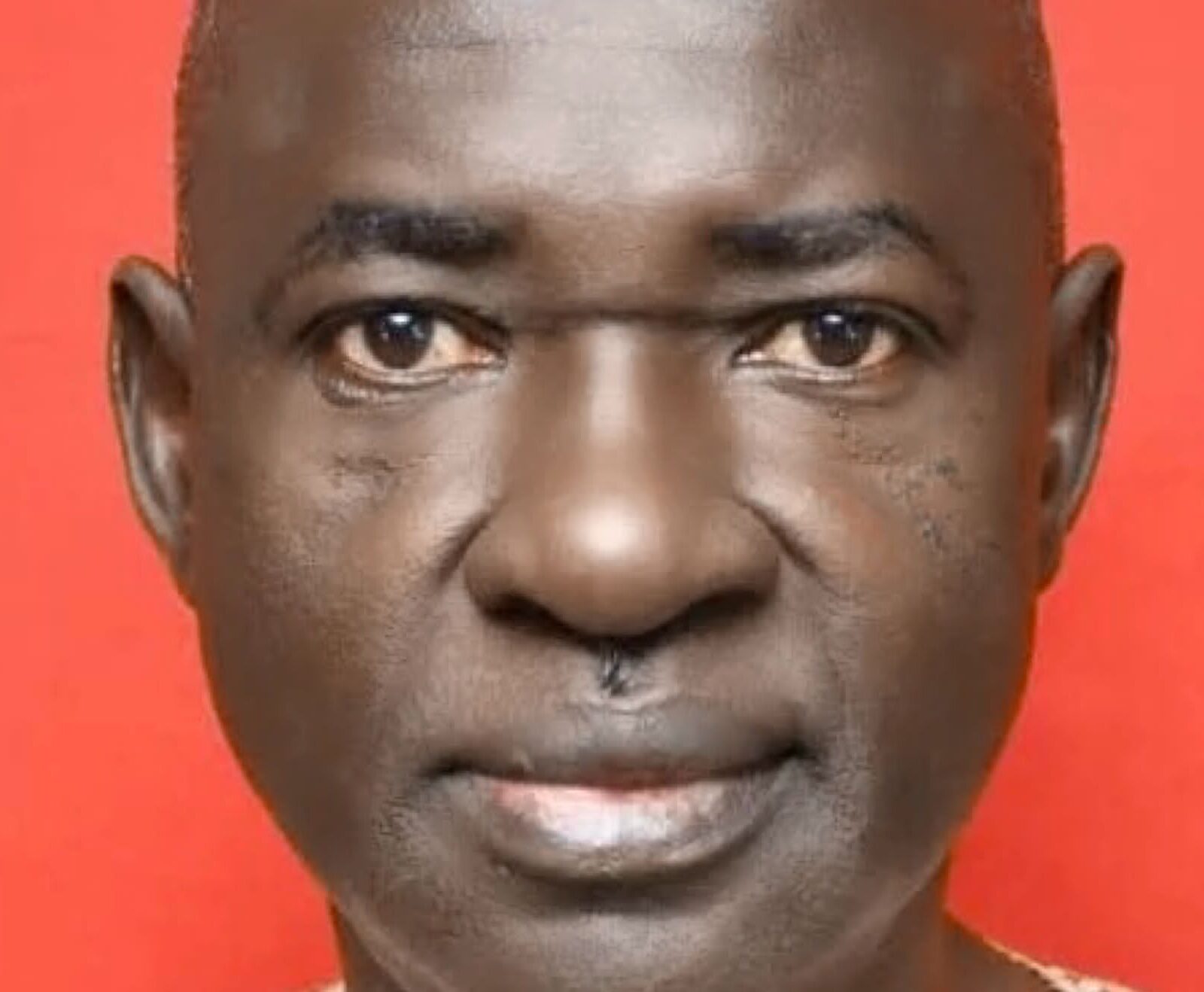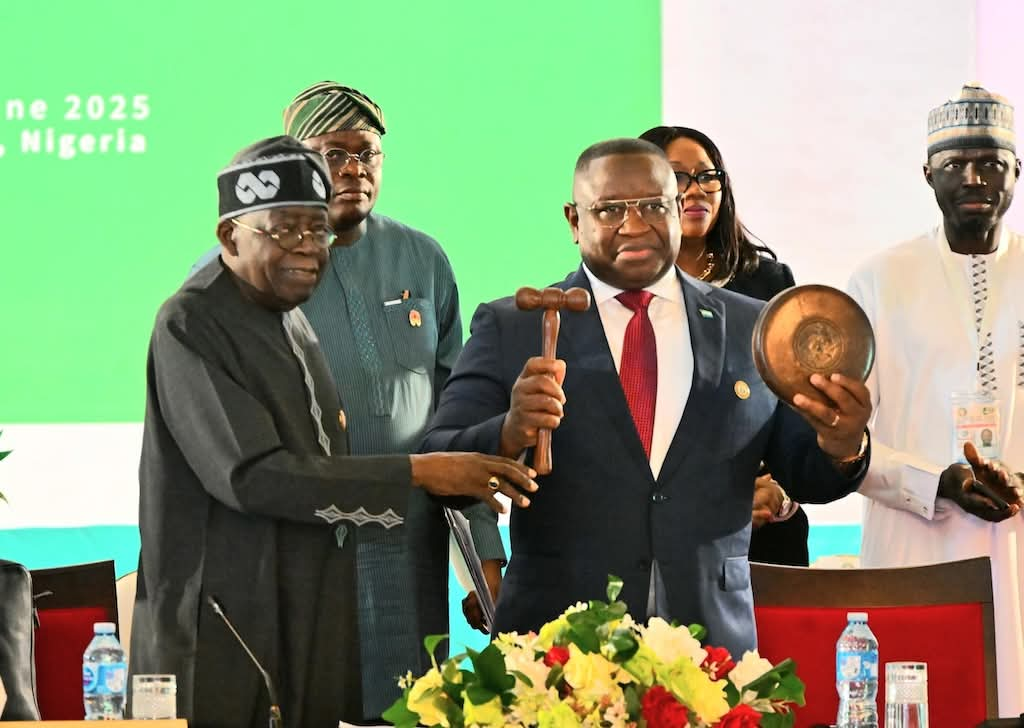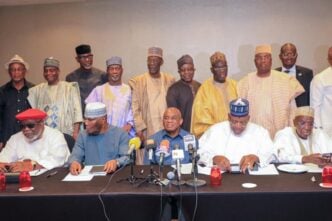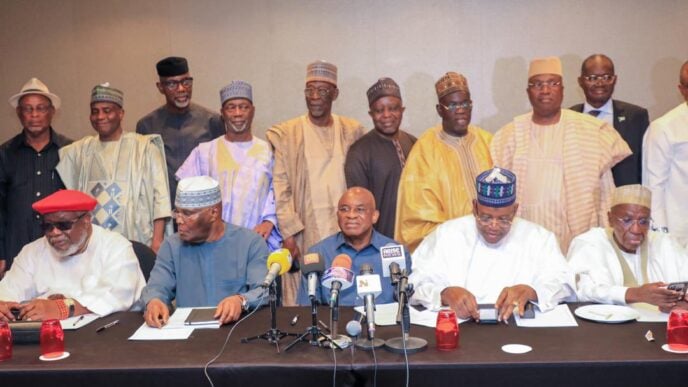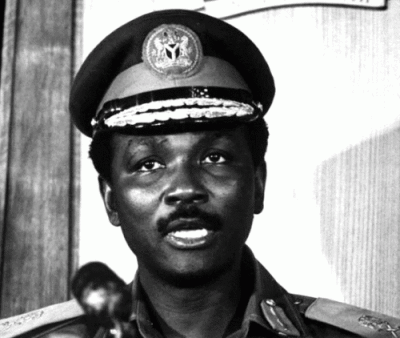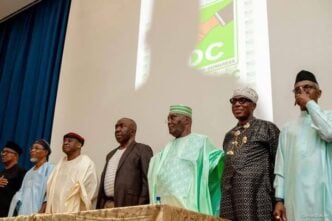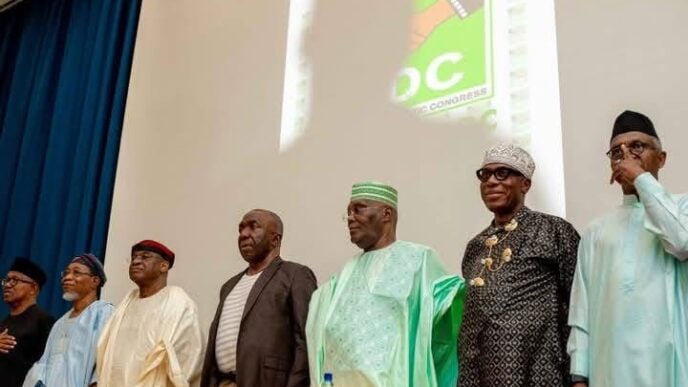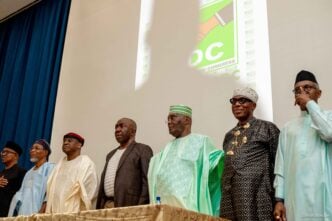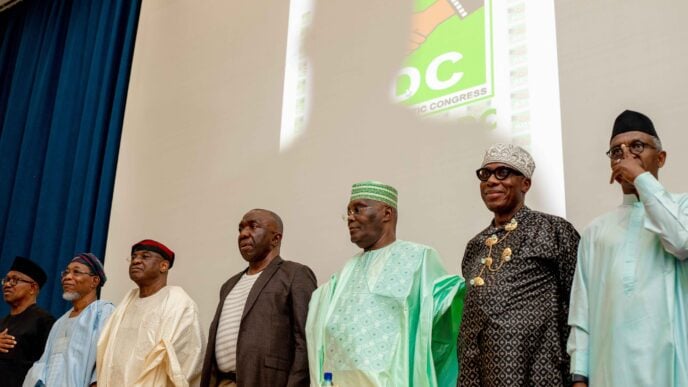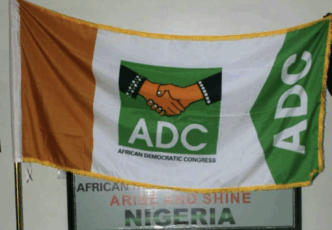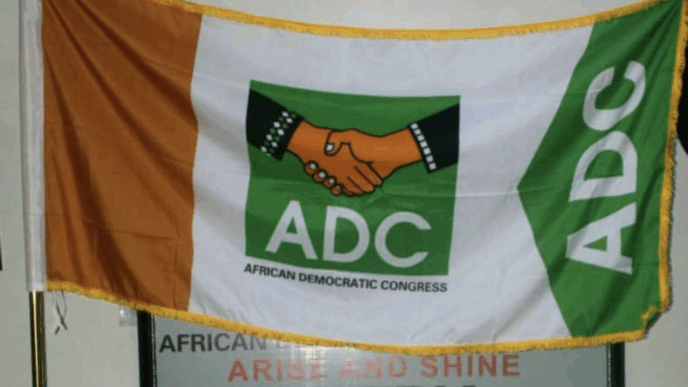President Bola Tinubu with Sierra Leone’s President Julius Bio, the newly elected ECOWAS chairman
The 67th Summit of the Authority of Heads of State and Government of the Economic Community of West African States ended last month in Abuja, Nigeria with President Julius Maada Bio of Sierra Leone assuming its leadership. He received the baton from Nigeria’s President Bola Tinubu after completing his two-term tenure. The change, in line with the tradition of rotation amongst the heads of government within the West African subregion, has come at a time when any occupier of the position simply can’t afford to be only a figure head. Yes, the sovereignty of individual countries is sacrosanct and well-captured in the statutes that govern the Community. And, granted, like his predecessors, Bio must continue to see himself as first among equals. Yet, the challenges on ground demand that the new chairman musters adequate courage to exhibit high-level pragmatic and productive statesmanship straightaway.
Tinubu’s handover note is worth reproducing here, partly: “Our organisation must continue to strike a fine balance between its core regional mandate of economic integration and the complex political, security, and governance challenges, including the preservation of democratic values in our region. Economic integration cannot be superimposed on an untenable political environment. That is why we must remain steadfast in our resolve to rise to these emerging challenges.” I won’t say those words are cheap as he had to maintain the practice of building bridges between outgoing and incoming leaderships on such occasions.
It’s too tempting, however, to ignore some of the things that transpired in the two years that the Nigerian leader headed the body that once held so much hope for the largely underserved peoples of West Africa. For instance, in a rare move and for a cocktail of reasons, Mali, Niger and Burkina Faso announced their departure from ECOWAS. The sanctions imposed on them and threats of forceful restoration of democracy in the trio amounted to nothing. Even when the multinational umbrella institution backpedalled and attempted to bring them back to the fold, it became clear that the three Sahelian countries were not joking. Their leaders – General Assimi Goita (Mali), General Abdourahmane Tchiani (Niger) and Captain Ibrahim Traore (Burkina Faso) – still don’t leave anyone in doubt about their resolve to stay above the fray and tackle their common problems their own way.
Tinubu won’t be able to distance himself from the failure of ECOWAS to, at least, successfully contend for its geographical integrity, if not unity and cohesion. Not a huge surprise from the Sahel, though, as Goita, Tchiani and Traore – soldiers and proud supplanters of democratic processes – are digging in with some success. Today, majority of the citizens of those nations appear not to miss the hyped dividends of representative governance, if the social media world which has helped in elevating these men to folk heroes is to be believed. So, a major part of the Tinubu legacy at the helm of ECOWAS is the reaffirmation of the difficulty of that assignment, a brief he has now dropped on Bio’s laps.
Advertisement
This isn’t a task the Sierra Leonian president should shy away from. The fact that the immediate past chairman presided over a seemingly impossible responsibility shouldn’t provide an alibi for any underperformance. One key stated rationale for the exit of Mali and co is the organisation’s inability to be of practical help in quelling the jihadist insurrection that threatens their corporate existence. The Francophone countries, of course, aren’t alone in being savaged by the menace but they’ve continued to bear the chunk of its consequences. Luckily, as a former military officer himself, Bio shouldn’t have much difficulty in leading his colleagues to still relate with Tchiani and co with a view to finding answers to the nagging security-related questions that have besieged many parts of West Africa for too long.
Thankfully, his reply to Tinubu was apt: “Our region is at a crossroads, the West Africa we lead today is facing serious challenges, some long standing, others new and evolving. We are still confronting insecurity in the Sahel and coastal states, terrorism, political instability, illicit arms flow and transnational organised crimes continue to test the resilience of our nations and the effectiveness of our institutions. The democratic space is under strain, in parts of our region, the constitutional order has been disrupted. Yet, across West Africa, citizens, especially our youth, are demanding not just elections, but accountability, transparency and a fair stake in national life.”
His professional background has hopefully prepared him for the nuances of jackboot incursion into politics and also the troubling prospects of the escalation of revolutionary ideas to the rest of West Africa – the section of the continent with the largest incidence of coups d’etat. Bio’s self-given priorities are remarkable: restoration of constitutionalism and democracy, revitalisation of security collaboration, enablement of economic integration, and strengthening the credibility of institution, all within the subregion. That’s a compact agenda, achievable through doggedness and thinking outside the box.
Advertisement
While acknowledging the fresh hurdles hinted in Bio’s acceptance speech, the enduring ones must now be confronted squarely. The secession of the three countries from ECOWAS makes the situation even dicier. My piece published in July 2024 titled “ECOWAS’ Weight Loss” put it thus: “By now, sceptics and cynics should have enough grounds to concede that something unprecedented is happening in this part of Africa. Never since the attainment of independence by African nations from their former colonial masters had they come together in this form and at a governmental level to openly challenge the abnormality…
“As for ECOWAS, they’ve stated in clear terms that any attempt to re-integrate them would be strongly resisted. From experience, even the mass appeal the radical leaders are enjoying in their bases now may not last long. The usual crack-down on dissent associated with military dictatorships may be employed in efforts to cement their stay at the top. And the northern borders of Mali, Burkina Faso and Niger are still home to terrorists who have imperilled the security of the Sahel for years.
“This is a disturbing picture of an uncertain future. The surest way for the ECOWAS mainstream is to be seen to make deliberate and visible efforts at good governance. It won’t happen overnight. But anything short of that would give the regional separatists the weapons to convince their local populations that the only way isn’t behind them but the new forward. That can further endanger the entire subregion with one of the worst border controls on earth.” My earlier article, “ECOWAS’ Existential Blues”, published in February last year at the wake of the aggrieved countries’ initial warnings equally expressed concerns about the disadvantages that would befall a fractured regional entity. For now, sadly, any wish to have them return to the body looks utopian.
No doubting the fact that Bio has enough issues on his desk in Freetown to weigh him down. Most domestic economic indices have been performing badly under his watch. Neither is the social aspect faring any better. Sierra Leone has one of the worst drug abuse statistics on the planet at the moment. The spread of addiction to ‘kush’ is reflective of the interdependency and communality of the member states of ECOWAS. The ultra-harmful synthetic cannabis is massively trafficked along the Mano River Basin bounded by Guinea, Cote d’Ivoire, Liberia and Sierra Leone.
Advertisement
This sad reality should actually energise Bio to give the chairmanship his best shot. It’s his turn to lead the charge to challenge West Africa’s daunting predicaments and expose its numerous potentialities to the other regions on earth, many of which have become wary of its stability and viability. At 50 years since its debut, Bio can and should pilot ECOWAS into a truly golden era.
Ekpe, PhD, is a member of THISDAY Editorial Board.
Views expressed by contributors are strictly personal and not of TheCable.
